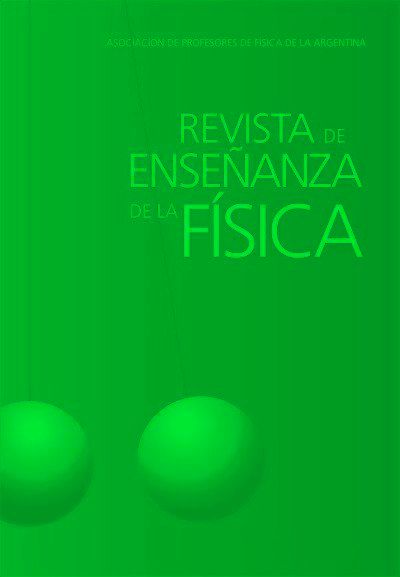Teaching fluid mechanics through hydraulic fracturing: a case of developing political sensibilities of people through socio-scientific issues
DOI:
https://doi.org/10.55767/2451.6007.v33.n2.35289Abstract
The main objective of this research was to contribute to the training process of students as political subjects through the teaching of
socio-scientific case of hydraulic fracturing. It was a qualitative investigation; a didactic unit of activities was designed and a focal group
was carried out with two students from the Bachelor's Program in Mathematics and Physics at the Universidad del Valle. For the data
collection, questionnaires and the recording of a virtual encounter between the students and the researcher were used. In the analysis,
the virtual encounter, the design and the previous ideas were triangled. The conclusions suggest that the use of this socioscientific
matter in the teaching of physics can allow the student to contextualize discipline and highlight the value of collective construction
between peers.
References
Álvarez, J., Castro, M., Cuesta, G., & Virviescas, L. (2013). El maestro como sujeto político y sus implicaciones en el campo
educativo y social, Caso: Hogar infantil mariposas. Trabajo de grado, Bogotá, Colombia: Pontificia Universidad Javeriana.
Castillo, K., Chaves, E & Moya, A. (2011). La investigación dirigida como un método alternativo en la enseñanza de las
ciencias. Revista ensayos pedagógicos, 6(1), 115-132.
Cerda, H. (1993). Los elementos de la investigación: como reconocerlos, diseñarlos y construirlos. Bogotá: El Búho.
Charry-Ocampo, S. & Pérez, A. (2017). Efectos de la estimulación hidráulica (fracking) en el recurso hídrico: Implicaciones
en el contexto colombiano. Ciencia e Ingeniería Neogranadina, 28(1), 135-164. DOI: 10.18359.
Heinberg, R. (2014). Fracking el bálsamo milagroso: La falsa promesa del fracking hace peligrar nuestro futuro. [Snake
oil. How fracking's false promise of plenty imperils our future] (Manuel Peinado Lorca), (2da ed). Barcelona: Icaria.
Hoyos, N. (2015). El rol del profesor desde su concepción de ciencia: aportes a la construcción del sujeto político. Tesis
de maestría. Cali, Colombia: Universidad del Valle.
Martínez, M. (2008). Redes pedagógicas: la constitución del maestro como sujeto político. Colombia: Editorial magisterio.
Martínez Ramirez, L. (2017). Efectos del fracking y estrategias de las principales potencias en las caídas del precio del
petróleo (Monografía para optar por el título de Especialista en Negocios Internacionales e Integración Económica). Bogotá: Fundación Universidad de América.
Sánchez Blanco, G. & Valcárcel Pérez, M.V. (1993). Diseño de unidades didácticas en el área de ciencias experimentales.
Enseñanza de las ciencias: Revista de investigación y ciencias, 11(1), 33-44.
Young, Hugh D. & Roger A. Freedman. (2009). Física universitaria volumen 1. 12 ed. México: Pearson educación.
Zenteno-Mendoza, B., & Garritz, A. (2010). Secuencias dialógicas, la dimensión CTS y asuntos socio-científicos en la enseñanza de la química. Revista Eureka sobre enseñanza y divulgación de las ciencias. 7(1), 2-25. DOI: 10.2526
Published
How to Cite
Issue
Section
License
Copyright (c) 2021 Mauricio Ortega, Nelson Hoyos, Roberto Nardi

This work is licensed under a Creative Commons Attribution-NonCommercial-NoDerivatives 4.0 International License.
Aquellos autores/as que tengan publicaciones con esta revista, aceptan los términos siguientes:Los autores/as conservarán sus derechos de copiar y redistribuir el material, bajo los términos estipulados en la Licencia de reconocimiento, no comercial, sin obras derivadas de Creative Commons que permite a terceros compartir la obra bajo las siguientes condiciones:
- Reconocimiento — Debe reconocer adecuadamente la autoría, proporcionar un enlace a la licencia e indicar si se han realizado cambios. Puede hacerlo de cualquier manera razonable, pero no de una manera que sugiera que tiene el apoyo del licenciador o lo recibe por el uso que hace.
- NoComercial — No puede utilizar el material para una finalidad comercial.
- SinObraDerivada — Si remezcla, transforma o crea a partir del material, no puede difundir el material modificado.
- Los autores/as podrán adoptar otros acuerdos de licencia no exclusiva de distribución de la versión de la obra publicada (p. ej.: depositarla en un archivo telemático institucional o publicarla en un volumen monográfico) siempre que se indique la publicación inicial en esta revista.
- Se permite y recomienda a los autores/as difundir su obra a través de Internet (p. ej.: en archivos telemáticos institucionales o en su página web) antes y durante el proceso de envío, lo cual puede producir intercambios interesantes y aumentar las citas de la obra publicada. (Véase El efecto del acceso abierto).














